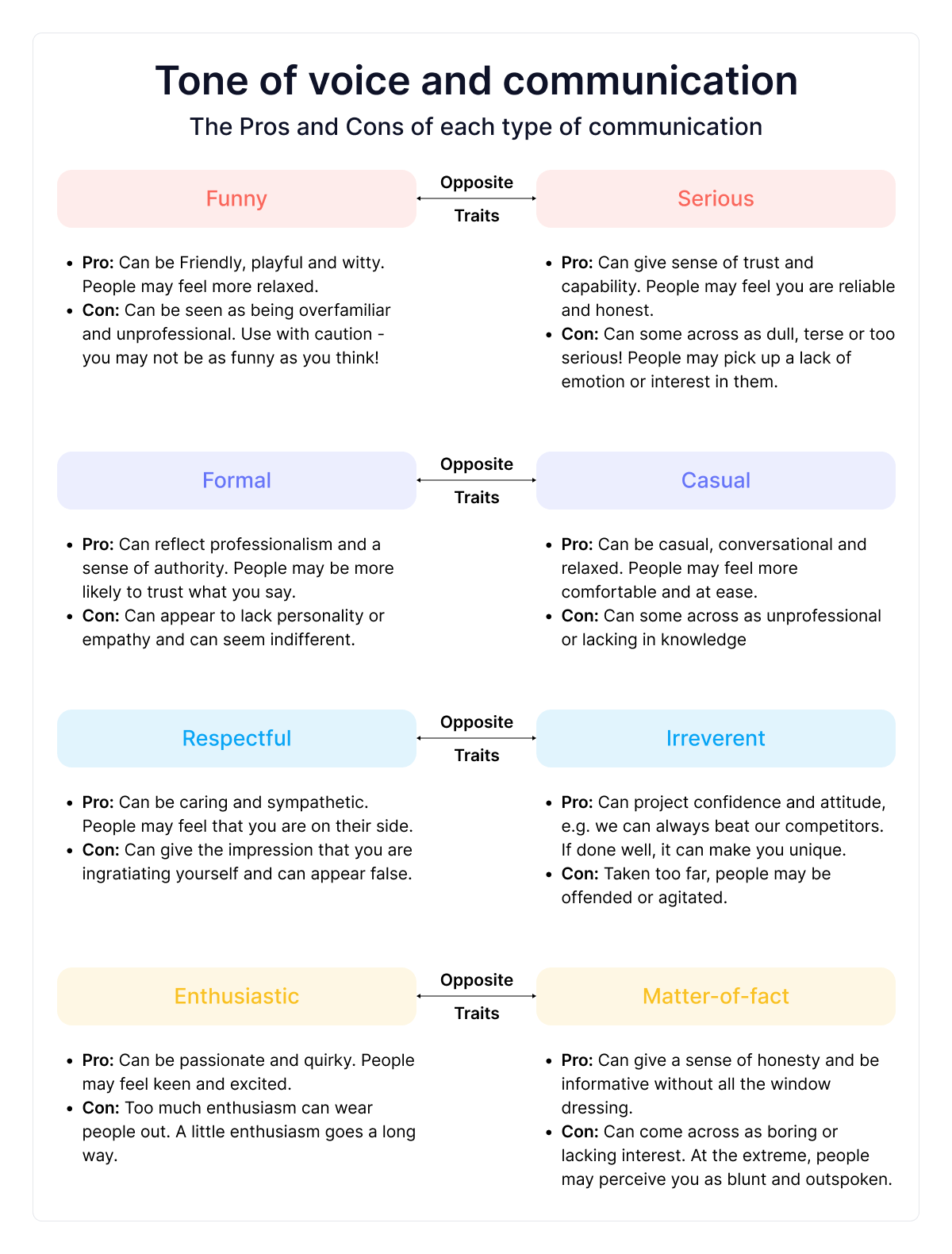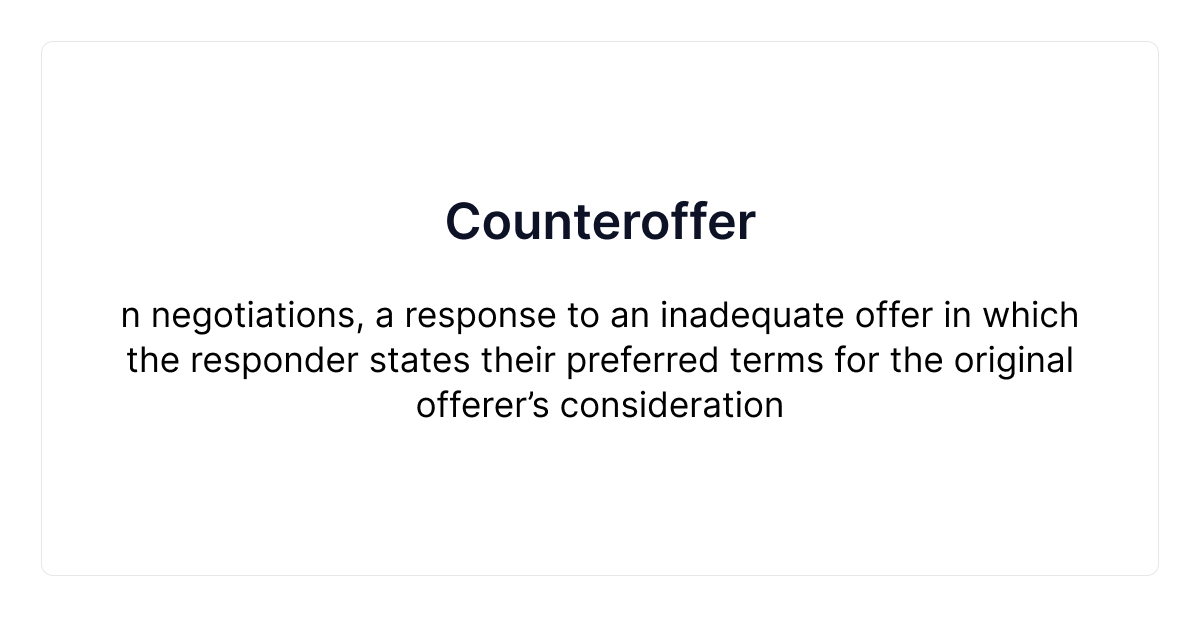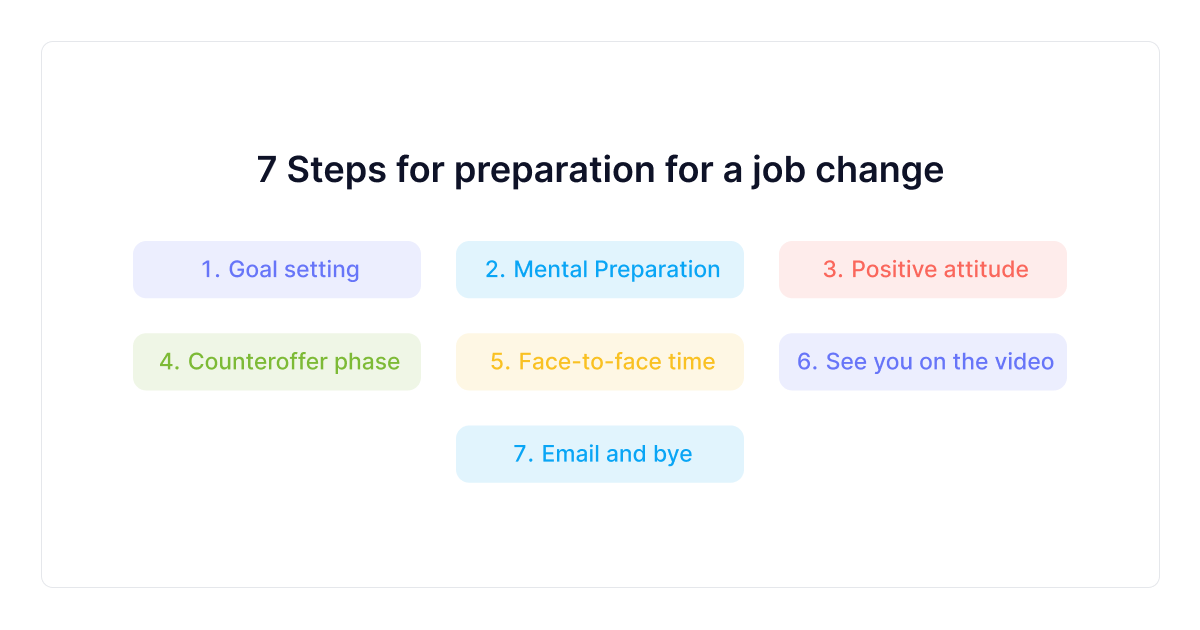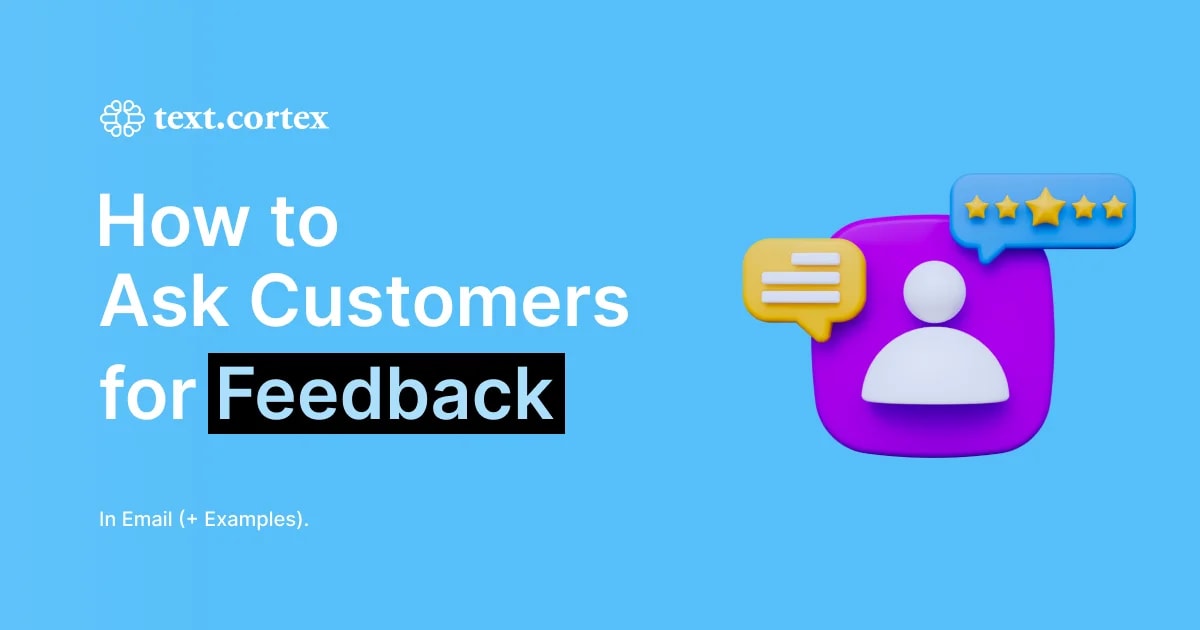Ever heard the saying 'Life happens'?
Well, it's more than just a phrase-it's the new reality we all navigate.
Among these life changes, switching jobs stands out as a critical moment demanding both speed and consideration.

This article is your roadmap to a seamless transition from your current role, focusing on preserving a positive and enduring professional relationship with your former employer.
We offer practical strategies for gracefully communicating your move to a new company, ensuring your departure is as respectful and strategic as your career path ahead.
Let’s begin!
7 Ways to Correspond with Your Employer If You Receive an Offer of Employment
You are not required to immediately take the position after receiving an offer.
Instead, you should consider your options and consider the best approach following this step-by-step guide.
1. Assess Your Goals And Be Truthful With Yourself
You must be clear about why you want to make the shift in the first place.
- Are you looking for a job that pays more and has more responsibility?
- Is it intolerable to work for your boss?
- Are you sick of the hostile environment at work?
It would be easier to organize your approach before speaking with your employer if you are aware of your future professional aspirations.
Ultimately, the last thing you want is to find yourself at a loss for words when you engage in an exchange of arguments.
2. Get Yourself Mentally Ready for the Meeting
▶️Louis Pasteur said: "Chance favors the prepared mind."

It might be disastrous to show up unprepared for a possible resignation meeting with your manager for numerous reasons.
It's possible that you'll become so nervous that you'll say something inappropriate or that you'll become "starstruck" and forget to bring up crucial topics.
Here are some general tips on how to mentally prepare:
- Reminder - Write down everything you would like to say to your employer.
- Cue Words - Elaborate why you've chosen to move on to a new project.
- Think Upfront - Be prepared to answer questions.
- Coffee is Good - Have a morning cup of coffee ☕
- Be Yourself - Relay on your abilities to avoid sketchiness.
3. Maintain a Positive Tone
The benefit of departing on good terms can provide you with a solid reference for your future career.
It's crucial to refrain from coming out as overly ready to leave your position, even if you're anxious to leave and move on.

It's especially important to refrain from criticizing your supervisor, coworkers, or present employer.
It would be beneficial to leave the door open for a future favorable reference.
Rather, communicate to your manager clearly and concisely that you have received an offer from another employer and state whether you intend to accept it or not.
If you want to find out more about switching between different tones of voice, check out this article. 👈
4. Get Ready for a Counteroffer
▶️Have your career goals aligned before the meeting?
You ought to be prepared for a more advantageous counteroffer and have a plan in place for handling it.
Experienced employees are frequently difficult to replace, therefore, your manager could be reluctant to lose a valuable employee.

Think about what you would like to receive from a counteroffer?
Possible considerations include:
- Improved compensation and working conditions?
- The ability to work remotely flexible hours?
- A promotion?
- New challenges?
Before scheduling a meeting with your manager, you should know the answers to these questions.
5. Plan a Face-to-Face Meeting With Your Employer
▶️Personal meetings guarantee no stone is left unturned.

Arrange a face-to-face meeting with your manager to discuss departure arrangements or work out a counteroffer.
It's a far more tactful way to do business than via phone or email.
Here’s how you should do it:
- Begin with Appreciation - Commence the discussion by expressing gratitude for the experiences and opportunities you have had working together.
- Honesty is the Best Policy - Tell them that you've accepted a job offer from another company but refrain from going into great detail about your reasoning.
- Be A Team Player - Offer to train your replacement or finish up outstanding projects to ease the transfer, as this shows how dedicated you are to your group.
- Follow the Script - Refrain from letting personal problems or complaints distract you, even if you have bad feelings about your current job.
- Show Compassion - Wrap things up nicely, assure them of your desire to assist with the adjustment, and attend to their worries.
Naturally, you should expect questions. Here are some you can anticipate to get:
- What are the reasons for your departure?
- Have you experienced any adverse effects recently?
- Is there anything I can do to reconsider your decision?
Express your thanks again as you finish the conversation and mention that you look forward to staying connected as business partners.
This creates the possibility of a fruitful future connection.
6. How to Handle a Video Meeting With Your Employer
▶️Video call provides fewer distractions than in-person meetings and ensures professional impact.
If you work remotely, then a video call can be a way to go.
To effectively engage in a virtual conference, you must possess the necessary internet, video, and audio capabilities.
Here are some rules on how to handle the video meeting:
- Don't Wait Until the Meeting Time to Log In - Join the video chat platform at least five minutes in advance to guarantee that the meeting begins on time and fix any technical issues.
- Be Mindful About Your Surroundings - Ensure that your lighting, background, and noise levels are suitable for effective communication.
- Don't Multitask - Avoid doing anything else when engaging in an important conversation.
7. Use Email to Inform Your Employer That You’ve Accepted a New Job
▶️ Emails are ideal and professional solutions in every situation, especially when communicating with your current employer.
When considering an email as an option to inform your employer about another offer, you can combine all the previous steps as your email outline.
Here is the checklist of things you should include:
- Write in the date and your details. ✔️
- Mark your job title and department. ✔️
- Address your manager by name. ✔️
- Make sure to include your resignation date. ✔️
- Be concise about your reasons for leaving the company. ✔️
- Consider offering your gratitude for the previous experience. ✔️
- Offer assistance with the onboarding of any replacement. ✔️
In case you are wondering what this type of email should look like, we’ve prepared a template for you:
Template: Informing Your Employer About Receiving Another Job Offer
Dear (Name of your boss),
I am writing to inform you that I have been offered a new job opportunity, which I have accepted, and I will be resigning from my current position as (Job title) at (Name of the company) effective (Date).
I have truly enjoyed working as part of your team, however, the new employment offer I’ve accepted opens up opportunities for my further career and personal development.
Thank you for the valuable experience and skills I’ve gained at your company. Furthermore, don’t hesitate to count on me if you need my help with the onboarding of any potential replacement for my position!
Sincerely,
(Your name)
🎁Bonus Tip — 5 Tips on What NOT TO DO When Telling Your Employer About Another Offer
🔴 Avoid Last-Minute Notices—Don't tell your boss you're leaving at the end of the week. Providing ample notice, even if not legally required, is more professional.
🔴 Bad Timing for Meetings—Avoid scheduling a crucial meeting on a Monday, as supervisors are often quite busy at the start of the week.
🔴 Using the Offer as Leverage—Don't use another job offer as a bargaining tool with your current employer.
🔴 Post-Acceptance Conduct—If you accept a counteroffer and decide to stay, avoid discussing this decision with your supervisor afterward, especially if staying involves significant risks.
🔴 Excessive Engagement—It's advisable to limit overly frequent interactions with your employer.
How Can TextCortex Help You Devise a Good Email for Your Employer?
It might be difficult to establish the perfect tone and voice for an email to inform your employer about official business, even if you know the basic steps to take.
Additionally, you might require assistance in selecting appropriate phrases and vocabulary.
Thankfully, TextCortex, a powerful AI-powered tool, possesses the necessary skills to compose polished emails.
Thus, with TextCortex, you can:
📢 Leverage a Zeno Chat, an AI assistant that can be entirely customized and generates content according to your instructions and preferred style.
📢 Take advantage of strong editing and rewriting tools, such as text completion, summarizing, rewriting, and paraphrasing.
📢 Make your content error-free by fixing spelling, grammatical, and style errors.
📢 Create your email using just three bullet points, then make additional adjustments.
📢 Adjust and select the ideal tone with our Tone Changer, offering over 10 options for selection.
📢 Produce and interpret your material in over 25 languages.
📢 Integrate TextCortex with over 4000 websites.
Does this sound tempting?
Sign up with TextCortex now to use our state-of-the-art writing tools to elevate your work!
FAQ
Should I Inform My Coworkers about My New Job Opportunity?
Yes, but you must let your manager know beforehand.
You can inform your coworkers of your decision after speaking with your employer and getting their approval.
When discussing your new job offer, be courteous and thoughtful, focusing more on the benefits of the new opportunity rather than the negatives of your current position.
These are the actions you can take to bid your colleagues farewell.
What If I Change My Mind about Leaving after Talking with My Boss about the Job Offer?
After speaking with your manager about the job offer, it's critical to let them know if you decide to change your mind about leaving.
Inform the organization that extended the job offer to you of your decision by getting in touch with them.
Next, explain to your manager why you've had a change of heart and want to stay in your current position.
Your supervisor may have doubts about your devotion going forward, so be ready to address these concerns and reassure them of your commitment to the business.

![How to Tell Your Employer You Have Another Offer[Practical Guide]](https://textcortex.com/cdn-cgi/image/format=avif,quality=90/https://assets-global.website-files.com/622611a2b23d0e6b270fba81/6580a144de4b2d0f41726069_Frame%201000006456.png)

.webp)
